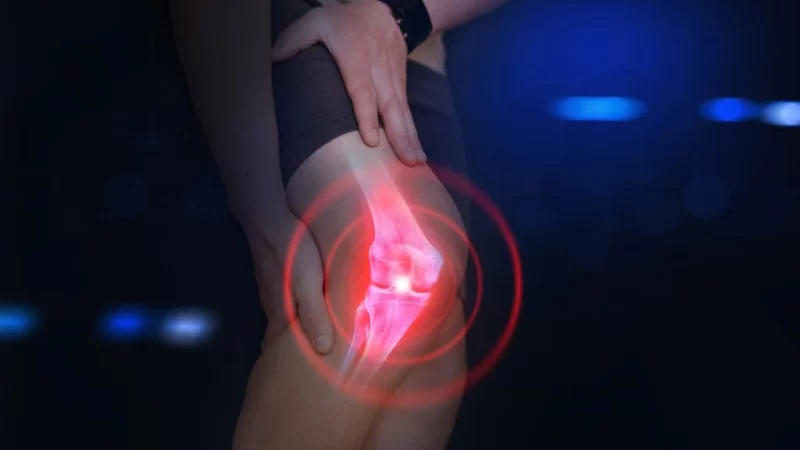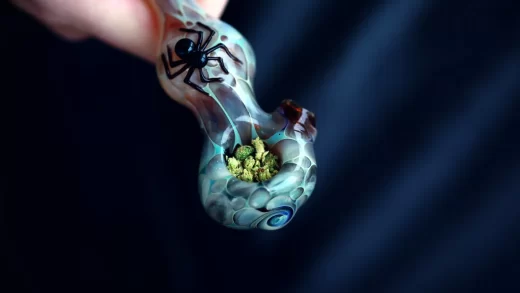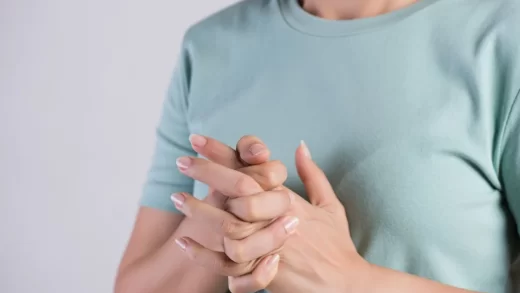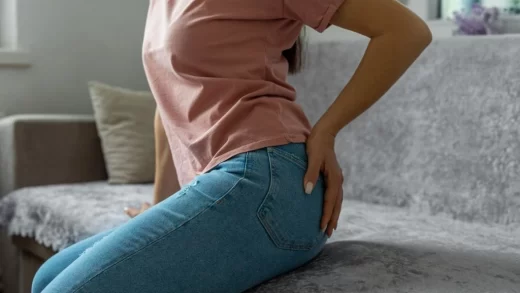Why Do My Knees Crack When I Squat? 5 Causes & Home Treatment

Do you know why do My knees crack when I squat for a variety of causes, you may squat, and your knees can make a popping or cracking noise. Is it a concern when your knee cracks while you squat? View this article.
You could squat during the day for a variety of purposes, including moving large things, exercising, or picking up your baby’s toys.
when you squat, the majority of you could notice a popping or crackling sound in your knees.
Some individuals may ignore this noise, known as Crepitus, but it can disturb those who are worried about the condition of their knees.
Do you believe your knee may be having a problem and are you concerned about this as well? Squatting causes the knees to creak, which is typical if you do not have any knee issues.
Although crepitus hurts, it might be a sign of a knee issue, therefore you should pay attention to it.
Whether knee cracking during squatting is a problem or not is covered in greater detail in the following paragraphs.
Why Do My Knees Crack When I Squat?
Whether you’re exercising or going about your everyday business, squatting puts strain on your knee joints.
Various joints may respond to this pressure in different ways; occasionally you may hear a pop sound or feel excruciating knee agony.
One of the body’s most delicate components, the knee may sustain significant injury from even little negligence.
Similar to snapping your knuckles or back while squatting, knee cracking happens for a variety of reasons.
Is it typical for a knee to break while doing squats, you may wonder? In response to your query, doctors explain that, in most circumstances, loud knees are not an issue unless they are accompanied by discomfort.
Before discussing the knee pop during squatting, it is preferable to first understand the knee joint.
Recommended: Why Do My Joints Crack All The Time Teenagers? 7 Causes
Anatomy Of A Knee Joint
The knee joint is made up of ligaments, synovium, bones, and cartilage, making it a fragile area of the body.
- Femur
- Tibia
- Fibula
- Patella
- Meniscus
The Femur (thigh bone), Tibia (lower leg bone), Fibula (bone in the lower leg), and Patella are among the bones (kneecap).
The two substantial cartilage pads known as the meniscus lessen the angle between the tibia and the femur.
Four ligaments link the bones, and in addition to bone and cartilage, the synovium fluid lubricates the joints.
All of these components are vulnerable to damage, and simply living a bad lifestyle may harm your knees.
When I Squat, Why Do My Knees Crack?
People who exercise or engage in knee-related activities often ask this question. As they straighten and bend their legs, they are worried about the clicking and cracking of their knees.
This crackling may frighten someone who is concerned about protecting their knees or who has ongoing knee issues, such as a runner’s knee. Is this an issue, though? There are several causes of crepitus or cracking, some of which include:
1. Bubbles Of Gas In Synovial Fluid
This is the most prevalent cause of knee cracking and is natural and occurs to everyone of all ages.
Gas bubbles gradually develop within the synovial fluid that covers the joints. So, as you’re squatting and bending your leg, some of these bubbles rupture, causing a bursting feeling or an audible “crack.”
Do not be concerned about the presence of crepitus since it is not painful when gas bubbles develop.
2. Joint Surgery
According to statistics of people who have had knee surgery, their knees become louder than previously.
This might be because of new joint characteristics or anatomical alterations made to the knee following surgery.
Cracked knees after surgery are not painful and do not impact people’s long-term attractiveness or quality of life.
Contrarily, medical professionals assert that patients really benefit from noisy knees after surgery since it increases their level of worry about the condition of their knees. One of the following factors might cause discomfort in your crepitus.
3. Knees Osteoarthritis (OA)
Researchers have shown that 10% of men and 13% of women in their fifties suffer from knee osteoarthritis.
Over time, this disorder degrades the cartilage that protects the joints, resulting in swelling and discomfort. Your knee joint may therefore become noisy and fractured.
4. Ankle Injury
Falling on your knee or being involved in a vehicle accident may both harm your kneecap. Your knees might shatter when you squat in these circumstances. This situation might be a sign of one of the following issues.
- Chondromalacia of the knee
- Meniscus tears
- Runner’s knee, also known as patellofemoral syndrome
So be careful to contact an orthopedist if you hear or feel painful crunching or grinding while moving your knee since that is not normal.
In this situation, even a little delay or act of negligence might harm your knee permanently.
Recommended: What Does A Crack Pipe Look Like? 8 Signs Of Additional Use
What Can I Do To Stop My Knee From Clicking?
Most individuals find knee cracking during squatting to be an uncomfortable condition. And many are trying to find a means to stop this noise.
Dr. Stearns asserts that “motion is a lotion” in this context, meaning that your joints will lubricate themselves the more you move.
However, if you remain still or lay down for an extended period of time, the synovial fluid in your joints will rise, which will cause gas bubbles to develop in it.
In addition, the following things may prevent a knee from popping:
- Select the appropriate exercise kind and include knee-stabilizing activities in your exercise routine.
- Squatting and lunge exercises may help to strengthen the quadriceps and gluteal muscles.
- Ensure that your form while squatting is correct.
- You may have to practice leaning back on your butt rather than your knee.
- If the action makes you uncomfortable, ease up on it.
- Always warm up and cool down before and after engaging in any kind of physical activity to reduce weight.
- To maintain normal leg alignment, use any orthotics that have been recommended.
Exercise stands out among all of these suggestions in a significant way. You might say that when I exercise, I hear these noises on my knee.
This can be because you performed the exercise improperly, particularly the squat. Your knees won’t break if you do the squat correctly, and you’ll also strengthen them.
4 | Home Treatments For Knee Cracking
Knee cracking, as was already noted, is a common occurrence that most individuals experience while squatting and is unproblematic.
However, it is recommended to attempt a variety of natural and home treatments before contacting your doctor if you have pain or other issues with a crunchy knee. Some of these DIY treatments are:
1. Oil Of Frankincense
The most effective natural remedy for joint arthritis is frankincense oil. Studies show that this herb’s extract lessens joint pain and inflammation, making it an effective therapy for osteoarthritis-related painful knee splits.
2. Turmeric
Turmeric contains curcumin, an active component and potent antioxidant with anti-inflammatory effects.
Researchers discovered in 2019 that curcumin capsules had osteoarthritis-treating effects that are strikingly comparable to those of diclofenac.
Therefore, it’s advisable to add extra turmeric to your meals or get it as a supplement from pharmacies if you are unable to utilize chemical medications like NSAIDs.
3. Resveratrol
A strong anti-inflammatory compound called resveratrol is also naturally present in foods including grapes, red wine, tomatoes, peanuts, soy, and certain teas.
Patients who routinely eat these vitamins and minerals or use Resveratrol supplements say their knee discomfort and squatting cracks have significantly decreased.
4. Fatty Acids Omega-3
One of the healthiest fatty acids found in fish oil is omega-3, which significantly lessens knee discomfort and cracking.
You may consume this healthy fatty acid as a supplement or in natural forms from foods like pumpkin seeds, walnuts, chia seeds, flax seeds, soybeans, and tofu.
In addition, you might try the following suggestions to stop the popping and pain:
- Using collagen, which serves as a lubricant to allow bones to move painlessly
- Change up your workouts and select low-impact exercises like cycling, swimming, aqua jogging, and water aerobics.
- Getting massaged by a trained massage therapist
- Rest, ice, compression, and elevation
- R.I.C.E. is the greatest treatment for any temporary discomfort you may have when squatting.
Conclusion
Knee popping during squatting may have a variety of negative effects on a person’s life, although being frequent and generally not an issue.
A person could get agitated, for instance, by the sound of knees during public events or while rising from a chair during a business meeting.
In the event that a particular knee issue does not bring on the cracking, regular and strengthening activities might drastically lessen the knee’s sound.
However, if it is accompanied by discomfort, it is best to contact an orthopedist to identify and treat the knee issue after attempting home cures. If you or a friend is experiencing a similar issue, write to learn more.














